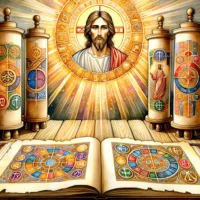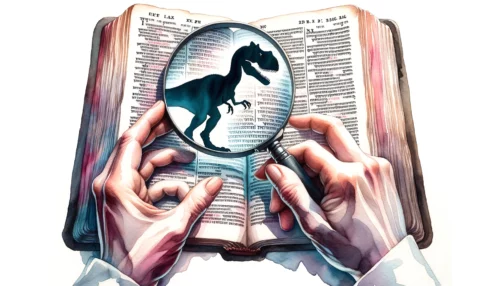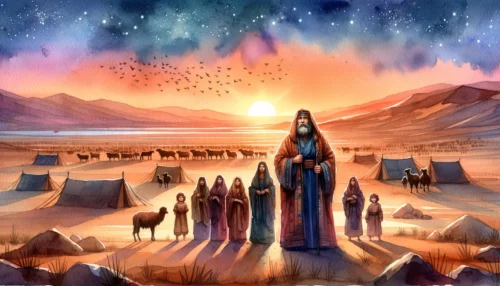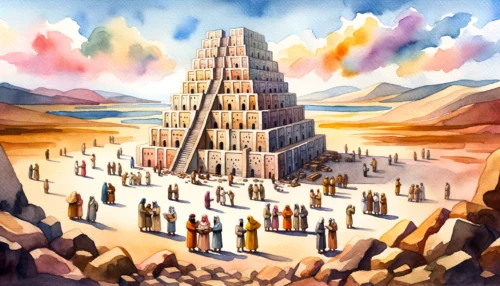In the scriptures, two individuals stand out for their unique journeys to heaven. Elijah, a fiery prophet who challenged the norms of his time, and Enoch, a man known for his profound walk with God, are both described as having been taken up to heaven without experiencing death. Through their lives and transitions to the heavenly realm, we encounter one of the greatest mysteries of our faith: the possibility of a direct ascent to heaven, bypassing the expected threshold of death.
Elijah: The Fiery Prophet’s Heavenly Ascent
Elijah, a prophet from Tishbe in Gilead, is a prominent figure in the Bible. His life and ministry were marked by powerful declarations of God’s word and numerous miraculous events, including bringing rain during a severe drought, raising a widow’s son from the dead, and calling down fire from heaven in a contest against the prophets of Baal.
One of the most extraordinary events in Elijah’s life, however, is his departure from Earth. Unlike most biblical characters, Elijah didn’t face a physical death. In a fascinating account found in 2 Kings chapter 2, it’s recorded that Elijah was taken up to heaven in a whirlwind.
This event was witnessed by Elisha, Elijah’s apprentice, who had asked for a double portion of Elijah’s spirit. They had been walking together when suddenly a chariot of fire, pulled by horses of fire, came between them. Elijah was then swept up in a whirlwind into heaven, a sight that Elisha watched in awe and sorrow (2 Kings 2:11).
This unique exit from the world raises questions about the nature of death and the afterlife in Christian belief. According to the account, Elijah did not die but was directly taken up to heaven. The passage in 2 Kings is clear that Elijah ascended to heaven in his earthly form. This implies that Elijah bypassed the process of physical death and resurrection, a cornerstone of Christian theology, and ascended directly to heaven.
The nature of Elijah’s departure also conveys significant theological implications. His miraculous ascent, an event of divine intervention, speaks to the sovereignty and power of God. It underlines the reality that God, in His might and wisdom, can act beyond our usual understanding of life and death.
His ascent also underscores the profound truth about our faith: that death is not the final end. It prefigures the Christian hope in the resurrection, as well as the promise of eternal life with God, transcending physical death. Elijah’s ascent to heaven is a testament to this Christian belief, offering a vivid depiction of the hope in the afterlife.
Elijah’s story doesn’t end with his ascent, though. He is mentioned in the New Testament as appearing with Moses during the Transfiguration of Jesus (Matthew 17:3). It’s also prophesied in Malachi that Elijah will return before the great and dreadful day of the Lord (Malachi 4:5).
Elijah, the fiery prophet, lived a life full of divine interventions, culminating in his unique departure from Earth. Rather than experiencing death, he was directly taken up to heaven in a whirlwind, witnessed by his apprentice Elisha. His ascension underscores God’s power to act beyond our understanding of life and death and affirms the Christian hope of life beyond physical death. Elijah’s story continues to impact Christian belief, depicted as returning in the New Testament and prophesied to return in the end times. His life and heavenly ascent remain a profound part of our faith narrative.
Enoch: The Man Who Walked with God
Enoch is one of the most intriguing figures in biblical history, not so much for what he did, but for what happened to him. His story, while short and somewhat cryptic, has a profound theological significance in Christian tradition. In the Genesis account, Enoch is introduced as a seventh-generation descendant of Adam, through the line of Seth (Genesis 5:3-18). He fathered Methuselah, the man famed for having the longest lifespan in the Bible.
Unlike other figures in Genesis, Enoch’s life is summed up in a unique way. It’s said that Enoch lived 365 years, a relatively short life compared to his antediluvian counterparts. But what sets Enoch apart is the description of his relationship with God. Genesis 5:22 tells us that after the birth of Methuselah, Enoch walked with God for 300 years. This notion of ‘walking with God’ suggests a life of close fellowship and obedience to God.
But the most striking aspect of Enoch’s story is his departure from Earth. Unlike his predecessors in the Genesis genealogy who lived, had children, and then died, Enoch is said to have been taken by God (Genesis 5:24). This passage presents a departure from the usual pattern, indicating that Enoch didn’t experience death but was directly taken to heaven.
Enoch’s case, much like Elijah’s, offers another rare biblical instance of a human being taken directly to heaven without experiencing death. The departure of Enoch, just like Elijah’s, illustrates that God can and does act beyond the normal laws of life and death.
The Letter to the Hebrews in the New Testament sheds more light on Enoch’s story. Hebrews 11:5 states that Enoch was taken up so that he should not see death, and that before his being taken he was commended as having pleased God. This provides a New Testament affirmation of Enoch’s unique end, connecting it explicitly to his faith and righteous life.
The mention of Enoch in Jude 1:14-15 refers to Enoch as a prophet who warned about the coming judgement of the ungodly. This reveals another layer of Enoch’s character, showing that he was not just a man of faith and righteousness but also a man of prophecy.
Enoch, a seventh-generation descendant of Adam, lived a life characterized by a close walk with God. Unique among his biblical contemporaries, Enoch did not experience death but was taken directly to heaven. This departure, mentioned both in Genesis and the New Testament, highlights God’s ability to act beyond the normal laws of life and death. Enoch’s story, reinforced by his portrayal in the New Testament as a man of faith, righteousness, and prophecy, brings a significant perspective to our understanding of the Christian faith and the afterlife.
Ascending to Heaven Without Death
The accounts of Enoch and Elijah ascending to heaven without experiencing death present a divine mystery that carries profound theological implications. In Christian tradition, these two instances challenge our usual understanding of the sequence of life, death, and afterlife. They underscore the power and sovereignty of God who operates beyond the laws of nature and our human understanding.
The Christian belief posits that after physical death, believers will be resurrected at the return of Christ (1 Corinthians 15:52). This process, a cornerstone of Christian faith, is bypassed in the stories of Enoch and Elijah. Their ascension to heaven brings to the forefront a different narrative. In these instances, we encounter a God who is capable of acting beyond the confines of mortality and the usual process of transition to the afterlife.
This divine mystery, seen in the ascensions of Enoch and Elijah, adds a dimension of wonder and hope to the Christian faith. It testifies to the belief in the afterlife and life eternal with God, reminding us of our ultimate hope as Christians.
Enoch and Elijah’s ascensions also present theological implications about God’s relationship with humanity. The fact that these men were taken up directly to heaven could suggest that their close relationship with God led to their unique departures. It could signal that their deep faith and righteous lives were not only pleasing to God but also granted them a special favor in God’s eyes. This connection to their faithfulness and righteousness is particularly highlighted in the New Testament (Hebrews 11:5) where Enoch is described as having pleased God before he was taken up.
Another implication of these ascensions revolves around the prophetic roles of Enoch and Elijah. Both figures reappear in the New Testament, Elijah during the Transfiguration of Jesus (Matthew 17:3), and Enoch as a prophet in Jude’s epistle (Jude 1:14-15). Their ascensions could serve as a divine endorsement of their roles as God’s messengers and prophetic voices, affirming the significance of prophecy in our faith tradition.
The ascensions of Enoch and Elijah without experiencing death present a divine mystery with deep theological implications. These instances challenge the usual understanding of life, death, and afterlife, affirming the power and sovereignty of God. They also bring a dimension of wonder and hope, highlighting the belief in life eternal with God. Their ascensions imply a close relationship with God and possible divine endorsement of their prophetic roles. These narratives provide us with a unique perspective on the Christian faith and our understanding of the afterlife.
Unraveling Heavenly Mysteries
The captivating stories of Enoch and Elijah ascending to heaven without experiencing death highlight the power and sovereignty of God who works beyond our human understanding. They challenge our conventional views of life, death, and afterlife, weaving a unique narrative in the divine tapestry of our faith. These instances serve as reminders of the profound mysteries and promises embedded in our Christian tradition, deepening our grasp of the heavenly realms and the nature of our eternal hope.
- What do the ascensions of Enoch and Elijah teach you about the nature of God?
- How does the concept of ascending to heaven without death influence your understanding of the afterlife?
- How might these narratives deepen your faith and understanding of the Christian hope in life eternal?
Let us find encouragement and inspiration in these divine narratives, recognizing the boundless power and profound mysteries of our God. As we continue in our faith, may we hold onto the heavenly hope promised to us, cherishing the eternal truths revealed in the stories of Enoch and Elijah.














